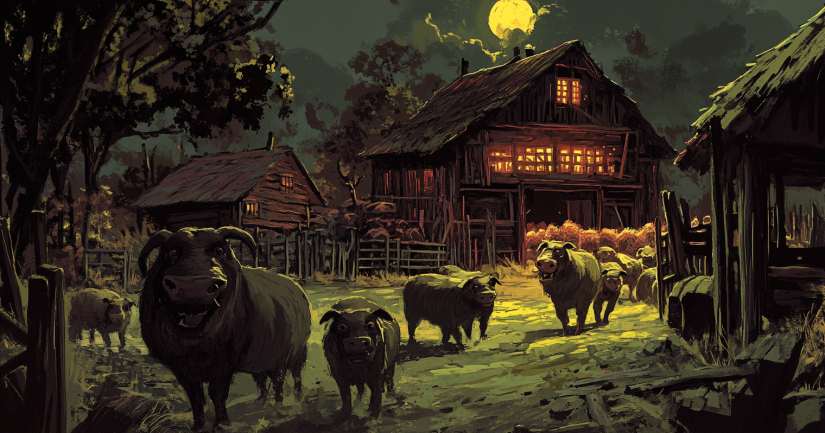
Welcome to the Animal Farm Chapter 3 Quiz! This engaging quiz invites you to dive deeper into George Orwell’s classic tale. As you answer questions, you’ll uncover key themes and character developments that shape the story. You’ll explore how the pigs begin to assert their power and the impact this has on the other animals.
The pigs, being the most intelligent animals, assume roles in planning and organizing. Snowball develops committees to educate and organize the animals, although some projects, like the reading and writing classes, see limited success. The sheep are taught to chant “Four legs good, two legs bad,” a slogan that reinforces animalism in a simple way. Discover what’s coming up in Chapter 4 with our Animal Farm Chapter 4 Quiz or test your memory.
Your Animal Farm Chapter 03 Quiz Starts Here – Are You Ready?
As you progress through the questions, you’ll discover connections between the characters’ choices and the broader messages of the novel. This knowledge will enrich your reading experience and enhance your appreciation for Orwell’s work.
Enter Orwell’s World of rebellion and power – test yourself with the Animal Farm Book Quiz.
Fascinated by Orwell’s twists in Chapter 3? with the Animal Farm Quote Identification Quiz.
What Happened – Animal Farm Chapter 3
In Chapter 3 of Animal Farm, the animals work together to establish their new society after the rebellion. They experience a successful harvest, marking the first time they are working for themselves rather than humans. Led by Boxer, whose personal motto becomes “I will work harder,” the animals put in great effort, and productivity improves. Sundays are established as rest days, with meetings held where all animals vote on farm decisions. Snowball and Napoleon emerge as the leaders, although disagreements between them begin to surface.
However, the pigs reserve privileges for themselves, such as taking the milk and apples. Squealer convinces the animals that the pigs need these foods for their “brainwork” to manage the farm, warning that if the pigs fail, Mr. Jones might return. Despite initial resentment, the other animals accept this justification. This chapter illustrates the early signs of inequality and manipulation among the animals, foreshadowing the conflicts that will emerge as the pigs consolidate power.
Animal Farm Chapter 3 – Quotes
- “I will work harder!” – Boxer, demonstrating his dedication and willingness to sacrifice for the success of the farm, symbolizing the strength and loyalty of the working class.
- “Four legs good, two legs bad.” – Sheep, chanting a simplified version of animalism, showing the influence of propaganda in reinforcing animal unity and simplifying complex ideas.
- “It is for your sake that we drink that milk and eat those apples.” – Squealer, justifying the pigs’ privilege by claiming it is necessary for their health, manipulating the animals through fear and persuasion.
- “The whole management and organization of this farm depend on us.” – Squealer, reinforcing the idea that the pigs are essential to the farm’s success, establishing their authority.
- “Surely, comrades, you do not want Jones back?” – Squealer, using fear of Mr. Jones to convince the animals to accept inequality, a tactic that reveals early manipulation and foreshadows further control.
Animal Farm Chapter 3 – FAQ
In Chapter 3 of Animal Farm, the animals begin to organize the farm’s operations following the Rebellion. They work diligently to harvest the crops, achieving greater productivity than ever before. The pigs, especially Snowball and Napoleon, take on leadership roles and establish committees to manage various tasks. Notably, the pigs also begin to reserve privileges for themselves, leading to tensions among the animals.
Following the Rebellion, the animals experience a sense of empowerment and unity. They enjoy the fruits of their labor, with food and resources distributed more equitably than under Mr. Jones’s rule. The animals feel motivated and hopeful, believing they can create a society based on equality and shared prosperity.
The pigs emerge as the intellectual elite of the farm, assuming leadership and guiding the other animals. They make key decisions, such as organizing work schedules and setting educational programs. However, their increasing authority raises questions about the balance of power and the potential for corruption among the rulers.
In the early part of the chapter, the principle of equality is embraced, with the animals working together towards common goals. They adopt the maxim “All animals are equal,” which symbolizes their commitment to a fair society. However, the pigs’ growing privileges hint at the forthcoming erosion of this ideal.
Chapter 3 contains several foreshadowing elements that hint at future conflicts. The pigs’ special privileges and the emergence of a leadership hierarchy suggest a shift away from the original ideals of Animalism. Additionally, the animals’ complacency and inability to question their leaders foreshadow the eventual betrayal of their revolutionary goals.
